
Well, hello again ! We keep crossing paths, don't we?
哦,又见到你了!我们总是遇到,对吗?
I know right? I swear I’m not stalking you. Since we keep running into each other, I might as well introduce myself, I’m Sherry.
我知道。但我发誓我没有在跟踪你。既然我们经常碰到,我就来做个自我介绍吧,我叫Sherry.
Nice to officially meet you Sherry, I'm Jake.
很高兴认识你,Sherry. 我叫Jake。
Oh, it’s so nice to have a name to go with the face. I am embarrassed to admit but I was identifying you as nice mustache man before.
哦,这真是太好了,终于把名字和脸对上了。我得很不好意思的承认,我之前都叫你"友好的胡子男士"。
How ironic ! I was calling you girl with the red glasses. So, what are your tasks here in the office building?
太有趣了!我之前叫你"红眼镜女孩儿"。你在这栋楼里做什么呢?
I work in the marketing and sales department. What is your job description?
我在市场营销部门工作。你的工作是什么?
I’m an IT technician. So you work in marketing? Usually the marketing department leaves by 6pm. However I keep running into your after that. It seems like you have been working a lot of overtime lately.
我是一名IT技术人员。你是做市场营销的?通常市场部下午6点下班。但我一直在下班后都遇到你,你最近好像经常加班。
Yes, IT has you working long hours too doesn’t it? That must be why we keep running into each other.
是的。IT技术部门工作时间也很长,是吗?这就是为什么我们总是遇到对方。
Speaking about work I better get back at it. It was nice meeting you! I’ll see you around.
说到工作我得回去工作了。很高兴认识你!回头见。
Likewise.
我也是。
Grammar语法
negative question tags
In our dialogue today, we see a few examples of question tags. A question tag is a short phrase added to the end of a statement to turn it into a question or to seek confirmation from the listener. It's a way of checking if the speaker's assumption or statement is accurate and inviting a response.
在今天的对话中,我们会看到一些反义疑问句的例子。反义疑问句是加在陈述句后面的一个短句,用来把陈述句变成问句,或者寻求听者的确认。这是一种检查说话人的假设或陈述是否准确并征求回应的方法。
Question tags are made up of auxiliary verbs and pronouns, like "don't we" in the opening line of our dialogue. However, other auxiliary verbs can be used, depending on the original sentence. For example, "You are French, aren't you?" uses a "be" verb instead of "do".
反义疑问句是由助动词和代词组成的,比如我们对话开头的一句“我们不要”。但是,根据原句的不同,也可以使用其他助动词。例如,“你是法国人,不是吗?”用的是be动词而不是do。
Also, very importantly, the tag is negative because the sentence is positive. If the sentence was negative, then the tag would be positive. For example: "It's not expensive, is it?"
另外,很重要的一点是,这个反义疑问句是否定的,因为原句是肯定的。如果原句是否定的,那么疑问句就是肯定的。例如:“它不贵,是吗?”
For examples:
1. You have good news, don't you?
你有好消息,是吗?
2. This has been really enjoyable, hasn't it?
这真的很愉快,不是吗?



 152
152 0
0